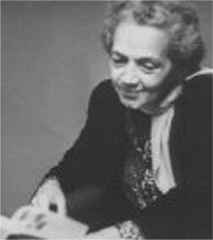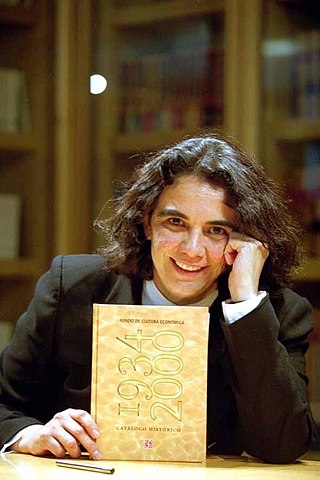
Laurette Séjourné was a Mexican archeologist and ethnologist best known for her study of the civilizations of Teotihuacan and the Aztecs and her theories concerning the Mesoamerican culture hero, Quetzalcoatl.
Armando Di Filippo is an Argentine economist, an economic science faculty member at the University of Rosario and Magíster in economic science at the University of Chile.

Jean Meyer Barth is a French-Mexican historian and author, known for his writings on early 20th-century Mexican history. He has published extensively on the Mexican Revolution and Cristero War, the history of Nayarit, and on the caudillo Manuel Lozada. He is a faculty member at the Centro de Investigación y Docencia Económicas, and a Guggenheim Fellow.
Antonio Alatorre Vergara was a Mexican writer, philologist and translator, famous due to his influential academic essays about Spanish literature, and because of his book Los 1001 años de la lengua española.
Fondo de Cultura Económica is a Spanish language, non-profit publishing group, partly funded by the Mexican government. It is based in Mexico but it has subsidiaries throughout the Spanish-speaking world.

Juan David García Bacca was a Spanish-Venezuelan philosopher and university professor. He was born in Pamplona on June 26, 1901, and died on August 5, 1992, in Quito, Ecuador. Bacca began his education under the Claretians and was ordained as a priest in 1925. He continued his studies at the University of Munich, the University of Zurich, and the University of Paris. However, during the 1930s, he left the Church and pursued philosophy at the University of Barcelona. In 1936 after criticizing Francisco Franco, Bacca was forced to live in exile. He first traveled to Ecuador where he taught at the Central University of Ecuador (1939-1942). While in Ecuador he became close friends with a writer named Alfredo Pareja Diezcanseco. He then went to Mexico where he taught at UNAM from 1942 to 1946. He eventually established himself in Venezuela in 1946 and was granted citizenship in 1952. Bacca was a professor at the Central University of Venezuela until his retirement in 1971. He was recognized for his life's work and was awarded the National Prize for Literature in 1978.

The Battle of Calderón Bridge was a decisive battle in the Mexican War of Independence. It was fought in January 1811 on the banks of the Calderón River 60 km (37 mi) east of Guadalajara in present-day Zapotlanejo, Jalisco.
Juan Antonio Nuño Montes was a philosopher, writer and university professor.

Roxana del Consuelo Sáizar Guerrero, is an editor and publisher, former CEO of Fondo de Cultura Económica (2002-2009), President of the National Council for Culture and the Arts (CONACULTA) (2009-2012) and President of the Regional Center for the Promotion of Books in Latin America and the Caribbean (Cerlalc) (2010-2012). She began her career working in the family printing business at her home state of Nayarit. After graduating with a degree in Communications in 1983, she began to manage editorial departments and publishing houses until 2002, when she was appointed director of government-owned Fondo de Cultura Económica, which is considered the largest publishing house in Latin America. She restructured the organization and started its electronic publishing program. In 2009, she was named President of CONACULTA, an institution devoted to promoting Mexican culture both domestically and abroad, that has since been transformed into the National Ministry of Culture.

Ricardo Lancaster-Jones y Verea, MA BE KHS was a Mexican historian and scholar who made significant contributions toward the study of the haciendas of the State of Jalisco (Mexico) in the twentieth century. His enthusiasm for history led him to become a professor of Regional History at the Faculty of Philosophy and Letters of Universidad Autónoma de Guadalajara in 1965. Later on, in 1973, he earned his MA degree in Latin American Studies at the University of New Mexico.

Roger Bartra Murià is a Mexican sociologist and anthropologist, son of the exiled Catalan writers Agustí Bartra and Anna Murià, who settled in Mexico after the defeat of the democratic forces in the Spanish Civil War. Roger Bartra is recognized as one of the most important contemporary social scientists in Latin America.
Carlos Marichal is a Mexican economic historian who currently works at El Colegio de México, where he has taught since 1989. He has done research and published widely on the economic and financial history of Latin America.

Carlos Llano Cifuentes was a Mexican philosopher and university professor, as well as one of the founding members of IPADE Business School and founder of Universidad Panamericana.
José Luis Martínez Rodríguez was a Mexican academic, diplomat, essayist, historian, bibliographer and editor. He was the director of the Fondo de Cultura Económica from 1977 to 1982 and professor of literature with the Faculty of Philosophy and Letters at the National Autonomous University of Mexico.

Jesús Martín-Barbero was a Spanish-Colombian communication scientist.
Blanca López de Mariscal or Blanca Guadalupe López Morales is a Professor emeritus and researcher in literature at Tecnológico de Monterrey, Campus Monterrey, México.

David Anthony Brading FRHistS, FBA, is a British historian and Professor Emeritus of Mexican History at the University of Cambridge, where he is an Emeritus Fellow of Clare Hall and an Honorary Fellow of Pembroke College. His work has been recognized with multiple awards including the Bolton Prize in 1972, the Order of the Aztec Eagle, and the Medalla 1808—both of which were awarded by the Mexican government—and the Medal of Congress from the Peruvian government in 2011.
François Chevalier was a distinguished French historian of Latin America. His most well-known publication is La formation des grands domaines au Mexique. Translated to Spanish (1956) and English (1963), it is a classic and pioneering work on agrarian history in colonial Mexico, a point of departure for later studies of Mexican haciendas sparking a discussion on whether they were fundamentally feudal or capitalist.

Ángel Bahamonde Magro is a Spanish historian. He is professor of Contemporary History at the Charles III University of Madrid (UC3M).

Guadalupe Dueñas was a 20th-century Mexican short story writer and essayist.












